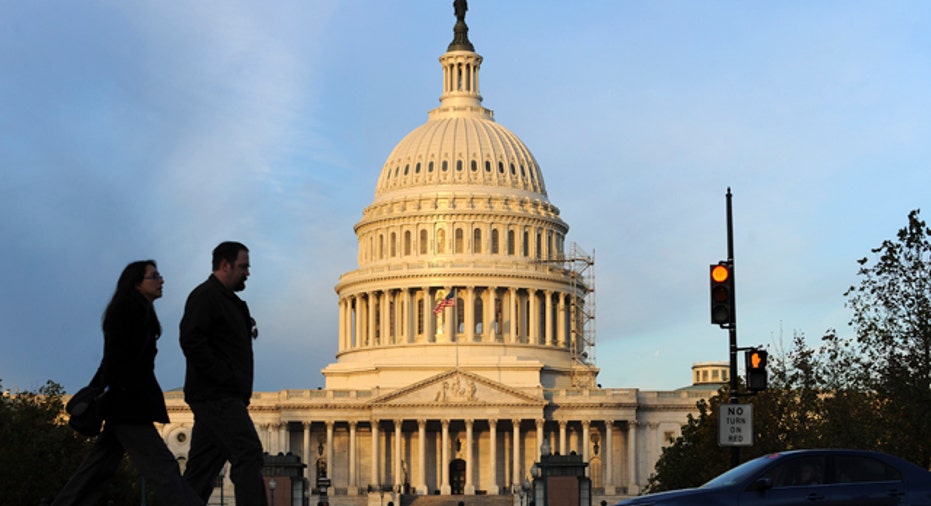Cornering the Market on Absurdities

President Barack Obama talked about the $2 billion “hedging” loss at JPMorgan Chase on ABC's "The View” this morning.
The president held up his silver sheriff’s badge in the form of the new Dodd Frank financial reform law, touting it as a big success because it will supposedly stop taxpayer-backed U.S. banks from making speculative trades (excuse me, “hedges” at JPMorgan) that do not benefit their customers.
But there’s a small problem in the form of big loopholes in this so-called Volcker rule, named after former Federal Reserve chairman Paul Volcker: Congress exempted from the rule speculative trades built on Fannie Mae, Freddie Mac or U.S. Treasurys.
Would you have heard so much harrumphing from D.C. if JPMorgan’s loss was due to derivatives built on Fannie, Freddie or U.S. government bonds?
Also, JPMorgan’s (NYSE:JPM) $2 billion loss — and counting — would not have violated the Volcker rule, anyway, because the rule only applies to trades held for up to just two months in a bank’s trading book, and not longer term trades or hedges like the one JPMorgan engaged in, where it was investing deposits in either long term loans or derivatives. But all those could change anyway once the bank lobbyists get done.
But besides, isn’t a zero interest rate policy at the Federal Reserve pushing the banks to reach for yield in all sorts of ways, since they can’t make money on traditional banking business in a zero-rate environment?
And separate from all that, when will the President come on FOX Business to talk about the $1.5 billion in investor money still missing at MF Global, formerly run by his friend and campaign fundraiser Jon Corzine? Or Medicare fraud?
Or how lawyers are living like pilot fish off of the morbidly obese Fannie and Freddie, which U.S. taxpayers now own and which have got an unlimited pipeline into the U.S. Treasury, with more than $150 billion net spent on them to date?
I’m not defending JPMorgan. Its “hedges” turned its “conservative” chief investment office into a profit center, responsible for up to 25% of its profit in some quarters.
And its overstated success story — “fortress balance sheet,” “no losses during the financial crisis” — ignores the fact that the bank was also first with its tin cup outstretched in Washington D.C. for help during the financial meltdown.
It was the first to jawbone the Federal Reserve into loading onto the central bank’s own balance sheet rotten assets at Bear Stearns that chief executive Jamie Dimon refused to take on.
That was before the failed insurer American International Group (NYSE:AIG) got the Federal Reserve to do the same, to act as a junk warehouse for all sorts of bad securities backed by things like defunct airports, strip malls and motel chains.
And along with other banks, JPMorgan (NYSE:JPM) also harangued the Treasury Department to agree to let the bank write off losses at Washington Mutual against profits on its tax returns, before it would agree to buying WaMu.
It did so in order to create bigger tax refunds, bigger bottom lines and bigger paychecks. Before that, banks were not allowed to take those tax write-offs, but anything goes in a crisis. Those write-offs were unheard of before then.
But the real issue is, we’ve got unseemly food fights breaking out in politics and on Wall Street, all of which show no one has yet to corner the market on impenetrably absurd behavior.
You can’t out-absurd California, which once again just increased its state budget deficit projection to a whopping $16 billion from just $9 billion a month ago.
Taxpayers, businesses and the other growth fairies Governor Jerry Brown was hoping for are now all flying away from the state.
California state officials for years have done reckless budgeting. For example, they easily get hypnotized and pencil in supposed capital gains tax revenues from dotcom or housing bubbles, and now the Facebook initial public offering.
But when those capital gains tax revenues don’t arise (because, say, investors sit on the gains or move out of the state, who would have thought it?), California then slams taxpayers with higher tax rates to paper over the budget holes, or the state cuts spending elsewhere.
All to pay for exorbitant government retiree pension or health-care costs, now flattening towns across California, and the state itself.
Those same pension funds run by officials who made rotten bets on commercial and residential real estate, like skyscrapers or housing developments, during the bubble, but were never called to task for those misjudgments and instead want you, the taxpayer, to pay for their foolish bets.
All of this is a moral issue. No country survives when its residents behave like victims.
No handout nation survives when its citizens believe they are owed something, that they are "entitled" to something.
Welfare states always destroy their ability to create wealth, and those who create wealth -- citizens who work hard and create the tax revenues to pay for all these things.
You cannot have a welfare state without wealth creation.
But when government gets bigger, citizens behave much worse. They get arrogant, greedy, envious. They talk more about how much time they can take off, or when the next vacation comes.
Instead of building this country for a brighter tomorrow, they attack those who work hard, prosper and create jobs.
They easily forget, or choose to ignore, that most of the taxpayers in the upper brackets do not start out on third base, that small businesses are in the top brackets, too.
In fact, on average half of those in the upper brackets will fall to the lower brackets and half of those in the lower brackets will rise into the upper brackets, as IRS data has shown through the decades.
But all of that is lost on a growing welfare state that can only exist on high and rising tax rates, powerful public unions and more government regulation.



















